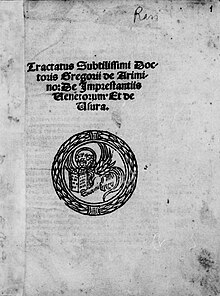|
Gregory of Rimini
Gregory of Rimini (c. 1300 – November 1358), also called Gregorius de Arimino or Ariminensis, was one of the great scholastic philosophers and theologians of the Middle Ages. He was the first scholastic writer to unite the Oxonian and Parisian traditions in 14th-century philosophy, and his work had a lasting influence in the Late Middle Ages and Reformation. His scholastic nicknames were Doctor acutus and Doctor authenticus. His views strongly influenced some of the Protestant Reformers.[1] LifeGregory was born in Rimini around 1300. He joined the Order of the Hermits of Saint Augustine before studying theology in the 1320s at the University of Paris, where he encountered the ideas of the late Franciscan Peter Auriol. In the 1330s he taught at Augustinian schools in Bologna, Padua and Perugia, where he became familiar with the recent work of Oxford thinkers such as Adam Wodeham, William Ockham, and Walter Chatton. He returned to Paris in 1342 to prepare his lectures on Peter Lombard's Sentences, which he delivered in 1342–1344. Because of his familiarity with English philosophy during this time, he effectively transmitted contemporary Oxford ideas—with an Augustinian tinge—to Paris. He became a Master of Theology in 1345 and subsequently taught at schools in Padua and Rimini. Gregory died in Vienna in 1358 shortly after being named General of his Order. PhilosophyIn his lifetime, Gregory composed a number of philosophical works including analytical tables to accompany his own lectures, tables on Saint Augustine's works, and a few governmental letters. Yet, his most important works are the lectures on Books I and II of Peter Lombard's Sentences. (This should have been on the four books, but books III and IV seem to have been lost, or were never written). Many later scholastics copied long passages from his works. Those who borrowed from him or were influenced by him include the Cistercian James of Eltville, Pierre d'Ailly, and Henry of Langenstein. AugustinianismThe most significant influence in Gregory's thought was St Augustine. Gregory studied Augustine more carefully and extensively than his predecessors, allowing him to critique Auriol for his misquotations, as well as for his Semipelagianism. Gregory was strongly shaped by Augustinian soteriology,[2] which implied double predestination.[3] He argued for double predestination, asserting that God's punishment was rooted in human sin but also decreed reprobation independently of individual sin.[2][4] Gregory adhered to Augustine's teachings on predestination and famously condemned unbaptized infants to Hell, earning him the nickname Infantium Tortor (torturer of infants).[5] He also supported the doctrine of limited atonement.[6] Theory of sentencesInitially, with the intention of defining theology and natural sciences, Rimini developed a theory of sentences to describe scientific knowledge. He believed sentences neither to be extra-mental nor propositional; in this theory, sentences signify something exclusively by the make-up of their terms, but are neither reducible to individual terms nor are "mental sentences" identifiable. Defenders of this view claim that beliefs about the world are too complicated to correspond to specific language structures and thus, cannot serve as objects of scientific knowledge. NominalismGregory Rimini had a unique take on traditional nominalist views. He thought that to contrive understanding in physical reality by incorporating abstract objects was nonsensical, due to his belief that mental objects are used strictly for convenient social conventions and nothing else. With this divide between complex thought and physical reality, Rimini also believed statements describing infinitely many points, infinitely many lines, infinitely many planes, etc. are all false. Since these are all mental, abstract objects, they only exist in the minds of people who think about them. Thus, the notion of physical infinity is not applicable. Furthermore, God was always in close relation to these abstract objects, too. Rimini's nominalist view claims that God has the ability to distinguish abstract objects but has no need to manipulate them. To Rimini, God has no need to manipulate mathematical propositions because he exists outside of time and thus, has no need to think deductively about the individual abstract objects anyway. Works
See alsoReferencesCitations
Sources
Further reading
External links
|
||||||||||||||||||||||
